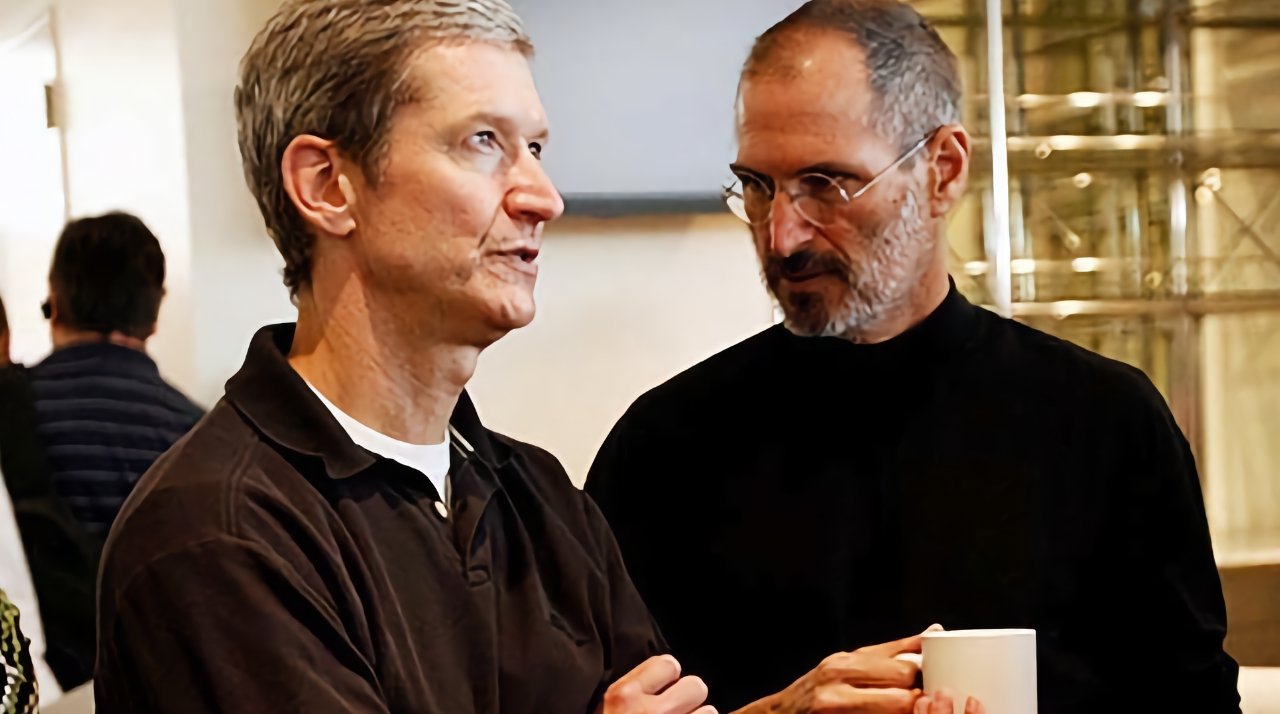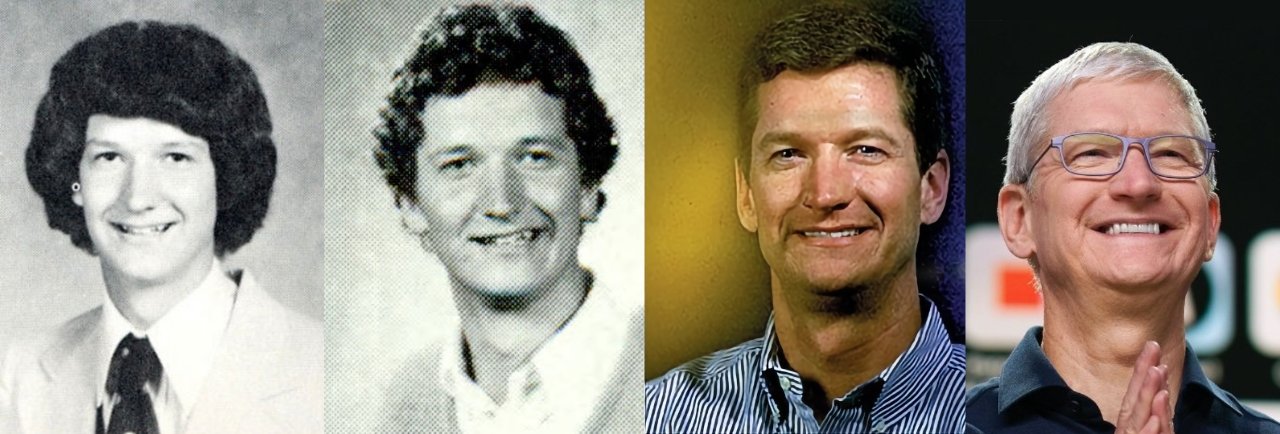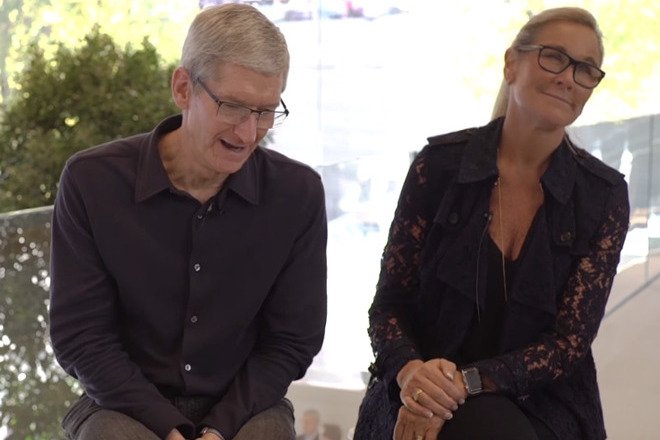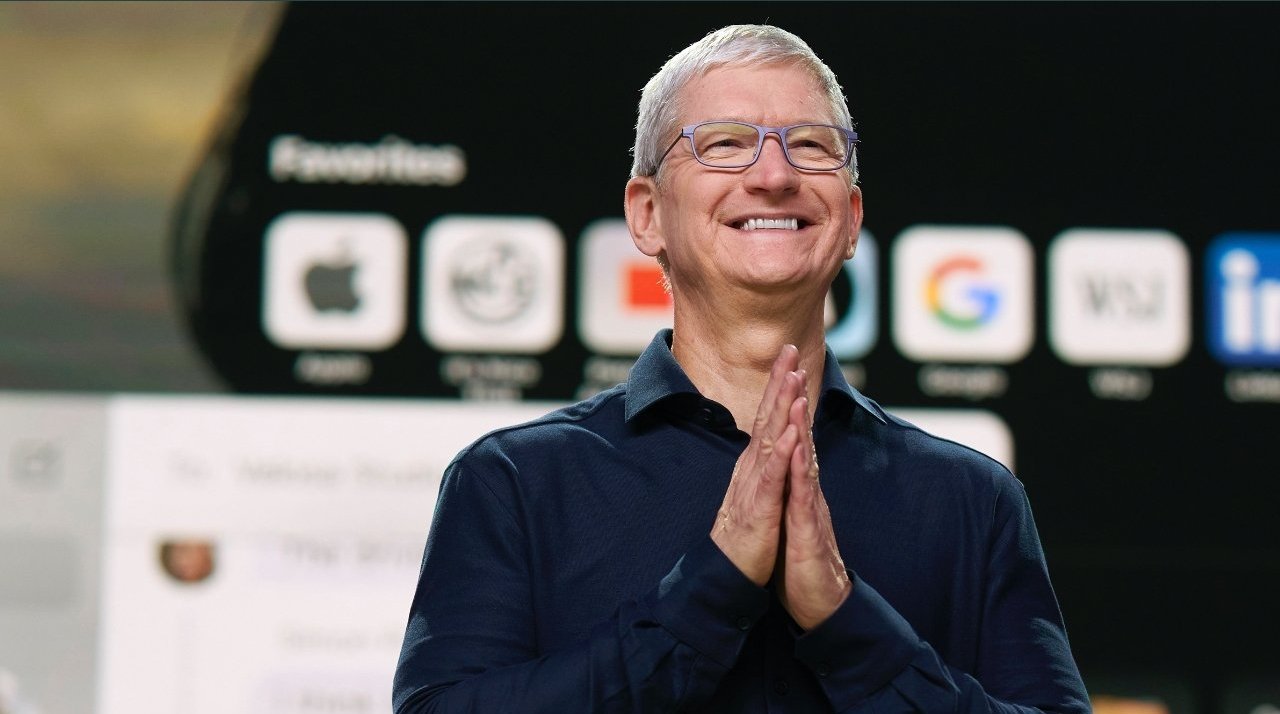How Tim Cook reshaped Apple in his first decade as CEO
Tim Cook is a very different Apple CEO than Steve Jobs was. but the company's astounding growth and evolution has its roots in all of Cook's previous experience.

Tim Cook with Steve Jobs
Tim Cook was officially announced as Apple's CEO on August 24, 2011, but the company's preparation for him to take over had begun much earlier. So had Cook's own preparation, the way that each element of his career and life up to then would become key to running Apple.
It was actually on August 11, 2011 when Steve Jobs told Tim Cook he was to be the new, permanent CEO of Apple. Jobs had phoned Cook, then 51, asking him to come over to Jobs's house to discuss Apple.
Jobs was severely ill, yet the two men discussed the handover with the specific assumption that Jobs would remain. The plan was for Jobs to be chair, but even as they both avoided discussing Jobs' health, issues, there were signs it couldn't be ignored.
First was how when Jobs called and Cook asked how soon they should meet, Jobs said, "Now." And the second was the way that during the following conversation, Jobs told Cook that, "you make all the decisions."
Unable to imagine Steve Jobs not controlling the company, Cook has said that he tried testing his friend. Repeatedly, Jobs said that decisions would be Cook's - though he hoped he'd be asked his opinion.
In early 2011, failing in its duties investors tried to force Apple into doing this, not knowing that a plan existed and was about to be put into action. Precise details of the plan and of who else may have been considered have not been revealed, but the decision to go with Tim Cook has.
In Steve Jobs's official resignation letter as CEO, he said so. "I strongly recommend that we execute our succession plan and name Tim Cook as CEO of Apple," he said.
The outside world hadn't dismissed Cook because he was not a product person like Jobs, or Jony Ive. It hadn't dismissed him because he lacked the stand-out reality-distortion field that Jobs did.
Instead, most people had failed to consider Cook because what he did for Apple was so invisible. It was invisible in the sense of the steps and the processes not being publicly discussed, yet they were supremely visible in the way that Apple was on its way to becoming an astounding global success.
It was how he did that, how he pulled off a worldwide effort across all of Apple, that made him CEO material. And it was exactly how he'd done this that he'd learned from his previous business and life experience.

Tim Cook L-R: 1978, 1982, unknown, and 2020 (sources; various, including Apple and Auburn University)
Presumably he doesn't get to compile iOS much these days, but back then he did create more efficient software for a traffic light system. And the local police adopted his software.
Cook has said that he doesn't think he was a star at anything in his studies, but he was unusually strong across multiple disciplines that have since proven essential. Alongside technology studies, for instance, he also became business manager of his school yearbook.
That year saw him responsible for selling advertising to fund the book project. And reportedly, he set new records for the amount of ads sold, plus then the number of copies of the book bought.
He would spend a dozen years working for IBM, and throughout the time was steadily progressing up the corporate ladder. Quite early on, he was ranked first in an internal list of High Potential, or HiPo, people who were expected to go far within the corporation.
Cook's roles and duties would change over those 12 years, but they started with him learning about the manufacturing process called Just in Time.
If there is one thing that Cook brought to Apple that made the company the success it is, it's Just in Time and related production control. JIT is far from rare, it is often used in technology firms, but Apple got it down to an extreme art.
Apple still makes Macs, and other devices, then stores them in warehouses until they're sold. But instead of them sitting there for months, they wait in this inventory chain for at most a few days.
Back when Cook started at Apple, that saved a lot of money on warehouse fees. Both back then and to this day, it also means that Apple has a lot of flexibility.
When Apple relied on Intel, if that firm brought out a new processor, Apple was able to use it faster than rivals because of JIT engineering and product control. It didn't have to wait until huge stocks of the new outdated models were sold first.
Cook learned this at IBM, and at the same time he also learned an MBA at Duke University on IBM's dime. Ultimately, he was so effective on what IBM called pipeline management -- getting products from components to customers -- that he was made director of fulfilment for North America.

Tim Cook and Jony Ive in 2015
He earned it. During his time at IE, Cook suffered a serious health scare. For a time, it was misdiagnosed as multiple sclerosis, but it turned out to be exhaustion.
On the happier side, in 1997 Cook recommended that IE sell itself to General Electric, and it did. Shortly afterwards, Cook left and joined Compaq.
Doubtlessly he brought the IBM Just in Time ideas with him everywhere he went, but reportedly it was at Compaq that he introduced Build to Order. Now familiar to Apple buyers, it was a new departure for Compaq and leveraged the flexibility that its JIT production line gave it.
Tim Cook only stayed at Compaq for six months. It's likely that he would have stayed much longer, quite possibly for the rest of his career, if it hadn't been for an invitation to meet Steve Jobs.
That man who had been so influential on the industry was then so influential on Cook. Tim Cook, so known for precision decisions about production pipelines and operational technicalities, basically joined Apple on his gut feeling that it was the right thing to do.
"Any purely rational consideration of cost and benefits lined up in Compaq's favor, and the people who knew me best advised me to stay at Compaq," Cook said later. "One CEO I consulted felt so strongly about it he told me I would be a fool to leave Compaq for Apple."
He joined Apple on March 11, 1998. Nearly twenty years later, he spoke about the decision again in a commencement speech at MIT.
"I was never going to find my purpose working some place without a clear sense of purpose of its own," he said. "I tried meditation. I sought guidance and religion. I read great philosophers and authors. In a moment of youthful indiscretion, I might even have experimented with a Windows PC. And obviously, that didn't work."
Not to knock Cook's claim of it being a gut feeling, he did get a half million dollar signing bonus from Apple, on top of a $400,000 salary. Yet in moving from Compaq, he was leaving a secure job for a company that was perilously close to bankruptcy.

One of Cook's main hires at Apple was retailer Angela Ahrendts in 2014
And reportedly Cook was genuine about moving to Apple to do good, to make a difference.
"To this day I remember meeting Tim," Deirdre O'Brien, now head of Apple Retail and People, told Leander Kahney for his book, "Tim Cook: The Genius Who Took Apple to the Next Level" in 2019. "And right off the bat it was very clear that he was very focused."
"He was incredibly excited about being at Apple," she continued. "He had a big job to do. You could tell he knew he had a mission."
By at most October 1998, six months after joining, Cook had got Apple's stock inventory down from 30 days to just 6. At some point in 1999, he got it down to 2 days.
He didn't change Apple by cutting costs. He did it by spending a lot of money in very precise and actually rather brave ways.
During 1998, his first year there, Cook bought $100 million worth of air transportation, of freight space on aircraft. He did it many months in advance of when the iMac G3, then not even announced, was going to ship.
Cook bought that space so that the iMac could get to customers -- and so that if Apple had a hit, it wouldn't lose out because rivals had all the shipping space. As it was, Cook's decision paid off because the iMac G3 was a success, and it was all of Apple's rivals who struggled to deliver their products.
If it sounds odd to describe spending Apple's money as brave, remember how fragile the company was at the time. And if it weren't brave, Cook wouldn't have succeeded because every firm would've been doing the same thing.
It takes some nerve to commit funds to a project, and Cook does not figure this out on his fingers. Reports vary, but there are at least very many thousands of Apple staff whose jobs are directly related to figuring out this product pipeline.

Tim Cook at WWDC 2020
Tim Cook has increased how Apple donates to charity, and he's become a much more visibly and politically outspoken CEO than Steve Jobs was. That's at least partly down to how the world has changed, and technology companies have become so crucial, but it is also seemingly part of how Cook works.
We'll never know what Tim Cook is really like, he is as shielded as any company CEO, and most of the time you can assume his public image is as crafted as an Apple product. But at times, what appears to be the real man comes through -- and not always intentionally.
In 2014, the right-win National Center for Public Policy Research tried to use a shareholders' meeting to force Apple to justify its environmental and accessibility practices in the dollars and cents of its return on investment.
"When I think about making our products accessible for the people that can't see or to help a kid with autism, I don't think about a bloody ROI," he said in an unscripted, off the cuff reply.
He was much more considered, he chose much more carefully, when he wrote a key op-ed for Bloomberg in 2015. In that editorial article, he announced that he is gay and that he was doing so to help.
"If hearing that the CEO of Apple is gay can help someone struggling to come to terms with who he or she is," he wrote, "or bring comfort to anyone who feels alone, or inspire people to insist on their equality, then it's worth the trade-off with my own privacy."
Instead, it appears now that Cook just got on with what he believed needed to be done. Whether he gets criticism or praise in the moment, his ten years to date demonstrates a long-term view.
Apple is often described as working to the long game and if anything it has been doing more of that under Tim Cook's aegis.
Read on AppleInsider

Tim Cook with Steve Jobs
Tim Cook was officially announced as Apple's CEO on August 24, 2011, but the company's preparation for him to take over had begun much earlier. So had Cook's own preparation, the way that each element of his career and life up to then would become key to running Apple.
It was actually on August 11, 2011 when Steve Jobs told Tim Cook he was to be the new, permanent CEO of Apple. Jobs had phoned Cook, then 51, asking him to come over to Jobs's house to discuss Apple.
Jobs was severely ill, yet the two men discussed the handover with the specific assumption that Jobs would remain. The plan was for Jobs to be chair, but even as they both avoided discussing Jobs' health, issues, there were signs it couldn't be ignored.
First was how when Jobs called and Cook asked how soon they should meet, Jobs said, "Now." And the second was the way that during the following conversation, Jobs told Cook that, "you make all the decisions."
Unable to imagine Steve Jobs not controlling the company, Cook has said that he tried testing his friend. Repeatedly, Jobs said that decisions would be Cook's - though he hoped he'd be asked his opinion.
Long time planning
As far as the outside world was concerned, Tim Cook was barely ever in the running to replace Steve Jobs. And as far as some people outside the company were concerned, Apple had been failing in its duties to work out a succession plan.In early 2011, failing in its duties investors tried to force Apple into doing this, not knowing that a plan existed and was about to be put into action. Precise details of the plan and of who else may have been considered have not been revealed, but the decision to go with Tim Cook has.
In Steve Jobs's official resignation letter as CEO, he said so. "I strongly recommend that we execute our succession plan and name Tim Cook as CEO of Apple," he said.
The outside world hadn't dismissed Cook because he was not a product person like Jobs, or Jony Ive. It hadn't dismissed him because he lacked the stand-out reality-distortion field that Jobs did.
Instead, most people had failed to consider Cook because what he did for Apple was so invisible. It was invisible in the sense of the steps and the processes not being publicly discussed, yet they were supremely visible in the way that Apple was on its way to becoming an astounding global success.
It was how he did that, how he pulled off a worldwide effort across all of Apple, that made him CEO material. And it was exactly how he'd done this that he'd learned from his previous business and life experience.

Tim Cook L-R: 1978, 1982, unknown, and 2020 (sources; various, including Apple and Auburn University)
Coder and business manager
Tim Cook has said repeatedly that he believes programming should be taught in schools because of the benefits it gives in critical thinking. He isn't just saying it, either, as it was coding and technology that he studied at Auburn, working on an Apple II.Presumably he doesn't get to compile iOS much these days, but back then he did create more efficient software for a traffic light system. And the local police adopted his software.
Cook has said that he doesn't think he was a star at anything in his studies, but he was unusually strong across multiple disciplines that have since proven essential. Alongside technology studies, for instance, he also became business manager of his school yearbook.
That year saw him responsible for selling advertising to fund the book project. And reportedly, he set new records for the amount of ads sold, plus then the number of copies of the book bought.
Joining IBM
Cook graduated in 1982 and was very soon working for IBM. The IBM PC had launched in 1981, and Cook joined the team working on it at the company's facility in the Research Triangle Park, North Carolina.He would spend a dozen years working for IBM, and throughout the time was steadily progressing up the corporate ladder. Quite early on, he was ranked first in an internal list of High Potential, or HiPo, people who were expected to go far within the corporation.
Cook's roles and duties would change over those 12 years, but they started with him learning about the manufacturing process called Just in Time.
If there is one thing that Cook brought to Apple that made the company the success it is, it's Just in Time and related production control. JIT is far from rare, it is often used in technology firms, but Apple got it down to an extreme art.
Apple still makes Macs, and other devices, then stores them in warehouses until they're sold. But instead of them sitting there for months, they wait in this inventory chain for at most a few days.
Back when Cook started at Apple, that saved a lot of money on warehouse fees. Both back then and to this day, it also means that Apple has a lot of flexibility.
When Apple relied on Intel, if that firm brought out a new processor, Apple was able to use it faster than rivals because of JIT engineering and product control. It didn't have to wait until huge stocks of the new outdated models were sold first.
Cook learned this at IBM, and at the same time he also learned an MBA at Duke University on IBM's dime. Ultimately, he was so effective on what IBM called pipeline management -- getting products from components to customers -- that he was made director of fulfilment for North America.

Tim Cook and Jony Ive in 2015
Moving on from IBM
In 1994, Cook got an offer he didn't resist. A Denver company called Intelligent Electronics made him Chief Operating Officer, with a base salary of $250,000 plus a signing bonus, and shares.He earned it. During his time at IE, Cook suffered a serious health scare. For a time, it was misdiagnosed as multiple sclerosis, but it turned out to be exhaustion.
On the happier side, in 1997 Cook recommended that IE sell itself to General Electric, and it did. Shortly afterwards, Cook left and joined Compaq.
Doubtlessly he brought the IBM Just in Time ideas with him everywhere he went, but reportedly it was at Compaq that he introduced Build to Order. Now familiar to Apple buyers, it was a new departure for Compaq and leveraged the flexibility that its JIT production line gave it.
Tim Cook only stayed at Compaq for six months. It's likely that he would have stayed much longer, quite possibly for the rest of his career, if it hadn't been for an invitation to meet Steve Jobs.
Enter Steve Jobs, exit Compaq
Cook has repeatedly said that he had not been interested in working at Apple. He took the meeting with Jobs specifically in order to meet this man who had been so influential in the technology industry.That man who had been so influential on the industry was then so influential on Cook. Tim Cook, so known for precision decisions about production pipelines and operational technicalities, basically joined Apple on his gut feeling that it was the right thing to do.
"Any purely rational consideration of cost and benefits lined up in Compaq's favor, and the people who knew me best advised me to stay at Compaq," Cook said later. "One CEO I consulted felt so strongly about it he told me I would be a fool to leave Compaq for Apple."
He joined Apple on March 11, 1998. Nearly twenty years later, he spoke about the decision again in a commencement speech at MIT.
"I was never going to find my purpose working some place without a clear sense of purpose of its own," he said. "I tried meditation. I sought guidance and religion. I read great philosophers and authors. In a moment of youthful indiscretion, I might even have experimented with a Windows PC. And obviously, that didn't work."
Not to knock Cook's claim of it being a gut feeling, he did get a half million dollar signing bonus from Apple, on top of a $400,000 salary. Yet in moving from Compaq, he was leaving a secure job for a company that was perilously close to bankruptcy.

One of Cook's main hires at Apple was retailer Angela Ahrendts in 2014
And reportedly Cook was genuine about moving to Apple to do good, to make a difference.
"To this day I remember meeting Tim," Deirdre O'Brien, now head of Apple Retail and People, told Leander Kahney for his book, "Tim Cook: The Genius Who Took Apple to the Next Level" in 2019. "And right off the bat it was very clear that he was very focused."
"He was incredibly excited about being at Apple," she continued. "He had a big job to do. You could tell he knew he had a mission."
Changing Apple and changing Apple's fortunes
Not everyone can have been as impressed with Cook as O'Brien was, because he was responsible for a lot of people being laid off. There's no clear accounting of how many jobs were lost, but Cook very soon shuttered warehouses and changed supply lines.By at most October 1998, six months after joining, Cook had got Apple's stock inventory down from 30 days to just 6. At some point in 1999, he got it down to 2 days.
He didn't change Apple by cutting costs. He did it by spending a lot of money in very precise and actually rather brave ways.
During 1998, his first year there, Cook bought $100 million worth of air transportation, of freight space on aircraft. He did it many months in advance of when the iMac G3, then not even announced, was going to ship.
Cook bought that space so that the iMac could get to customers -- and so that if Apple had a hit, it wouldn't lose out because rivals had all the shipping space. As it was, Cook's decision paid off because the iMac G3 was a success, and it was all of Apple's rivals who struggled to deliver their products.
If it sounds odd to describe spending Apple's money as brave, remember how fragile the company was at the time. And if it weren't brave, Cook wouldn't have succeeded because every firm would've been doing the same thing.
It takes some nerve to commit funds to a project, and Cook does not figure this out on his fingers. Reports vary, but there are at least very many thousands of Apple staff whose jobs are directly related to figuring out this product pipeline.

Tim Cook at WWDC 2020
Cook becomes CEO
All of this far-sighted attitudes, coupled to precise control of the production cycle, was surely what made Cook the right person to replace Steve Jobs. He was far from being a clone of Jobs, had far from the same approach, but he was right for the next stage of Apple.Tim Cook has increased how Apple donates to charity, and he's become a much more visibly and politically outspoken CEO than Steve Jobs was. That's at least partly down to how the world has changed, and technology companies have become so crucial, but it is also seemingly part of how Cook works.
We'll never know what Tim Cook is really like, he is as shielded as any company CEO, and most of the time you can assume his public image is as crafted as an Apple product. But at times, what appears to be the real man comes through -- and not always intentionally.
In 2014, the right-win National Center for Public Policy Research tried to use a shareholders' meeting to force Apple to justify its environmental and accessibility practices in the dollars and cents of its return on investment.
"When I think about making our products accessible for the people that can't see or to help a kid with autism, I don't think about a bloody ROI," he said in an unscripted, off the cuff reply.
He was much more considered, he chose much more carefully, when he wrote a key op-ed for Bloomberg in 2015. In that editorial article, he announced that he is gay and that he was doing so to help.
"If hearing that the CEO of Apple is gay can help someone struggling to come to terms with who he or she is," he wrote, "or bring comfort to anyone who feels alone, or inspire people to insist on their equality, then it's worth the trade-off with my own privacy."
Changing perceptions of Tim Cook
Tim Cook didn't particularly set out to make his mark as CEO, to make quick moves to show that he was now in charge. He was quick to eject Steve Jobs favorite Scott Forstall, but that was not removing a rival, it was in response to how Forstall handled the poor launch of Apple Maps.Instead, it appears now that Cook just got on with what he believed needed to be done. Whether he gets criticism or praise in the moment, his ten years to date demonstrates a long-term view.
Apple is often described as working to the long game and if anything it has been doing more of that under Tim Cook's aegis.
Read on AppleInsider

Comments
At the time of iPod success and meeting the leaps in production/supply needs, the bond was set between Tim Cook and Steve Jobs. They were learning from each other at that point.
The next two critical individuals beyond Steve Jobs and Tim Cook were Avie Tevanian (OSX platform) and Jony Ives (design).
Who else were so highly critical after these four?
The expansion in models of most products and the development of Apple silicon for all product lines are consistent with that prediction, but at least for the Mac, it took a lot longer than 5 years to play out. I was really surprised by how long Apple stuck with Intel.
I never would have guessed original programming through AppleTV. Relatedly, I vastly underestimated what Services would contribute to the bottom line.
Apple Watch and AirPods are two pretty successful new product under Cook's watch, so I think he avoided my concern about stagnating. True, there's no 'replacement' for the iPhone, but it's not clear there needs to be one.
Overall, I'd say clearly a success. Probably the most important decision left for him to make (although it's not entirely up to him) is picking a successor.
Of course none of this makes sense if you’re s socialist who believes my wealth is your wealth.
Apple is the largest US taxpayer last I read. Contrast this all the household names who pay $0 in federal income tax - Amazon, Netflix, FedEx, etc etc. They don’t pay a dime, which to me is worse than Apple not repatriating offshore-revenue taxes.
No man is an island, and the disproportionately vast fortunes made by the very wealthy are the result of public invest — infrastructure, financing, worker welfare, corporate welfare, public education, etc. Taxing the upper brackets of their revenue (or heck, any of it, since we now know our billionaires pay $0 in income tax) to invest back into the society that gave rise to them is prudent. We don’t need more billionaires, but we do need paid time off for new parents, sick leave, and other various safety nets the working class and working poor classes need in other to prosper. The rising tide raises all ships. Billionaires pay lower tax rates than their personal secretaries do (often $0). That’s fucked up.
Sure. If he thought of or improved implementation. Although, I think it predated Cook.
Apple designing their own silicon and doing it better than anyone else is a major differentiator for Apple.